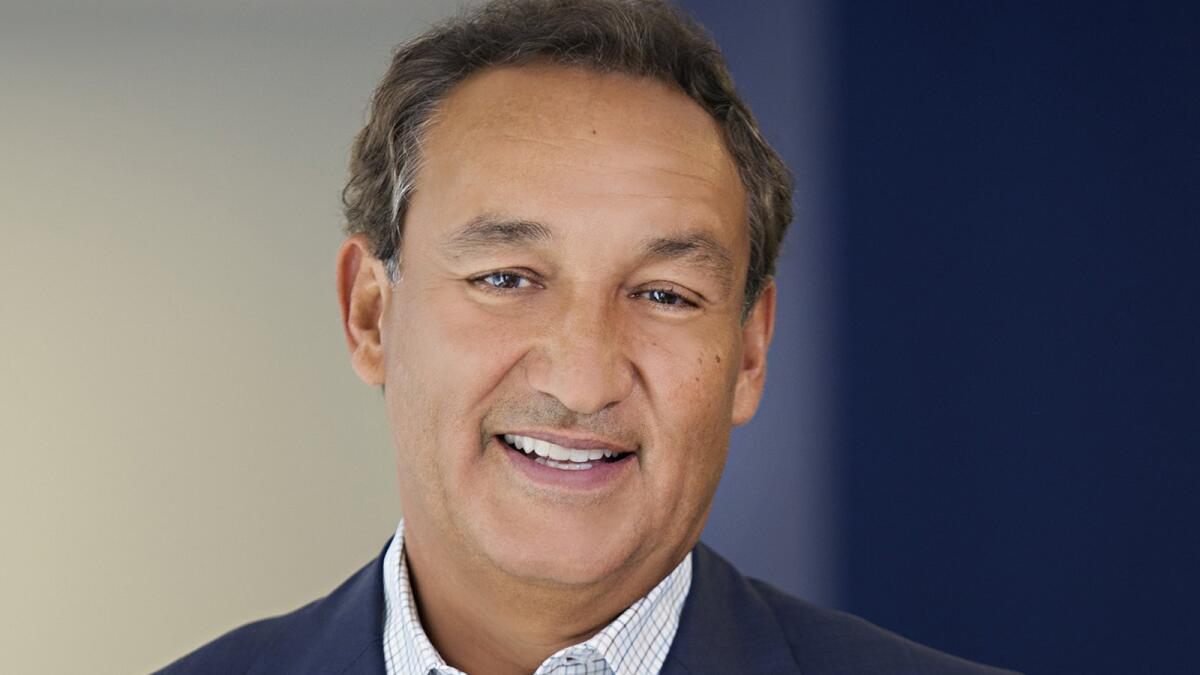Q&A: Does a company have to disclose when a top executive has a serious medical problem?

Oscar Munoz, the CEO of United Continental, had a heart-transplant operation.
- Share via
If a top executive of a publicly held company suffers a serious medical problem, what should the company tell the world — and how soon?
It’s vital knowledge for the company’s stockholders, employees, customers and suppliers. But there’s also the executive’s right to privacy to consider.
The debate is being played at out Viacom Inc. and CBS Corp., where the mental competency of 92-year-old Sumner Redstone, the executive chairman of both companies, has been called into question.
That’s prompted some institutional investors to seek more disclosures about Redstone’s condition. CBS announced Wednesday that Redstone had resigned as its executive chairman and was named its chairman emeritus.
Two other examples: United Continental Holdings Inc. said last month that the airline’s chief executive, Oscar Munoz, had a heart-transplant operation after suffering a heart attack in October.
And Michael Pearson, chief executive of Valeant Pharmaceuticals International Inc., has been on medical leave since late December after being diagnosed with severe pneumonia.
Steve Jobs’ long battle with cancer, and Apple Inc.’s limited disclosure about the condition of its co-founder before he died in 2011 at age 56, also fueled the debate.
We asked securities expert Keith Bishop, 58, a partner at the law firm Allen Matkins in Irvine, to explain the issue. Here’s an edited excerpt:
When a top executive has a major medical setback, why don’t companies immediately announce it?
There may be concerns about legality and privacy. If the CEO has not authorized the disclosure of personal information, the company may find itself in trouble if it’s releasing information. There’s no blanket exemption from all privacy laws in the federal securities law. That is, there’s no specific obligation under the federal securities laws to disclose the health condition of executives.
If a company chooses to disclose the health condition they may be in violation of other laws, like the American With Disabilities Act or other privacy laws. You don’t check your privacy at the CEO’s door.
Do companies resist saying anything only for legal reasons?
There’s sensitivity to that person’s situation. Or if the person has expressed a desire that this not be publicized, as fellow human beings, there’s reluctance.
It is fundamentally a really delicate situation for companies to face. In today’s culture, where so many celebrities are willing to put everything out there in terms of their personal lives, maybe people feel like these CEOs have the same publicity motivations. But they have families, their own personal zone of privacy and may not be looking at that same level of full exposure. It’s very difficult to divorce the human element from this.
Who normally makes the decision about what to say publicly, especially if the CEO is debilitated in some way?
Usually it would be the board of directors. They’re going to discuss a disclosure framework. But there will probably be input from the company’s lawyers, the company’s PR people and the CEO to the extent he or she is able to participate.
Are there Securities and Exchange Commission rules that govern all this? Don’t they require disclosure of “material” information about a company?
Companies don’t have an obligation to disclose information just because it’s material. Under the SEC rules there are certain things they are required to disclose, like certain types of material litigation, but there is no “health-of-the-CEO” disclosure requirement. Just because it’s material doesn’t trigger an automatic duty on the part of a company to disclose the information.
But companies may fall into a duty to disclose in other ways. A company may choose at first to remain silent but if it comments and says the CEO’s health is fine and the company knows it’s not fine, that’s going to be a legal problem for the company.
If an executive is diagnosed with a major illness, do the stockholders have rights to know about it?
I don’t think just because there is a diagnosis, which the company becomes aware of, that it triggers an automatic duty to disclose the illness. A stockholder might want to know that, but there are a lot of things a stockholder might want to know that the company does not have an obligation to disclose.
Redstone is a controlling shareholder of Viacom and CBS. If the sick executive also is a major stockholder of the firm, does that change any of this?
Legally I don’t think it changes anything. From the stockholder’s perspective, I get it. If the CEO is also a major stockholder, I might be wondering what’s going to happen to those shares if he or she passes away. But as a lawyer I don’t think it changes the legal analysis.
Twitter: @PeltzLATimes
ALSO
In the West, skyscrapers are reaching for new heights
As Clinton seeks to break the glass ceiling, many young feminists shrug
L.A. County man wants judge to declare him winner of $63-million Lotto jackpot
More to Read
Inside the business of entertainment
The Wide Shot brings you news, analysis and insights on everything from streaming wars to production — and what it all means for the future.
You may occasionally receive promotional content from the Los Angeles Times.











